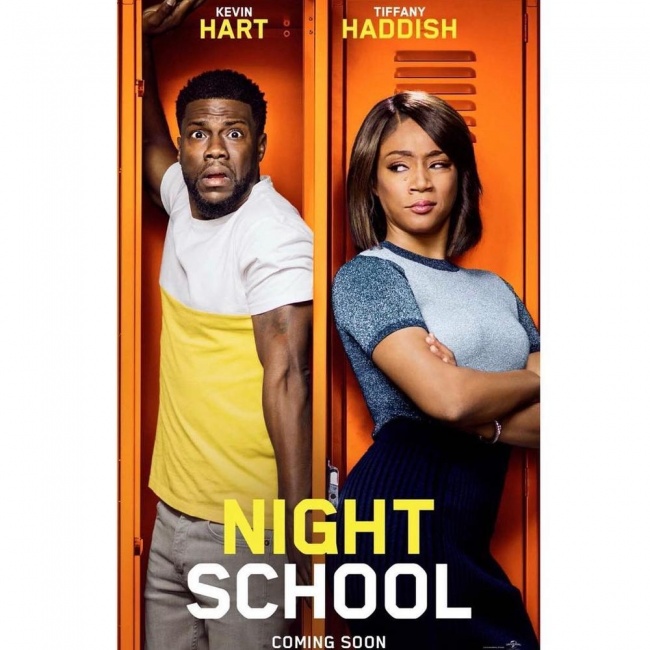The Tiffany Haddish/Kevin Hart comedy Night School took the weekend box office crown with an estimated $28 million, while the Warner Bros. Animation feature Smallfoot took second with a $23 million debut. Together these newcomers helped power the box office to its first year-over-year win in September with the top 12 films earning 15.1% more than they did during the same frame last year when Kingsman 2 topped the charts for the second weekend in a row with $16.9 million.
While this was the first year-over-year win of the month, it must be noted that September 2017 (largely thanks to the megahit adaptation of Stephen King’s It) was the best ever in box office history—and September 2018, while it hasn’t reached that record level, is still the second highest grossing September in box office history, which means that 2018’s trajectory as the biggest box office year yet (in dollars, not the number of tickets sold), remains on track through the first nine months of the year.
Comedies of all stripes have been struggling at the box office over the past two years, so it’s good to see that Night School, which was directed by Malcom Lee and produced by Will Packer, the team behind one of the few 2017 comedy hits, Girls’ Trip, is off to a strong start (the second best opening for comedy film in September ever). The critics, who loved Girls’ Trip, were lukewarm on Night School, giving the brash film just a 31% positive rating on review aggregator Rotten Tomatoes, but opening weekend audiences, which were evenly split along gender lines, and a bit older with 59% over 25, gave the film a strong “A-“ CinemaScore. Night School attracted a diverse crowd that was 37% Caucasian, 30% African-American, 24% Hispanic, 5% Asian, and 4% other.
Coming on the heels of the enormous success of John M. Chu’s Crazy Rich Asians, a romantic comedy that debuted in August with $26.5 million and has now earned $165.7 million, Night School may represent a reversal of the box office trend that saw funny films underperforming. Though Night School, which cost a reported $29 million to produce, is unlikely to have the “legs” of Crazy Rich Asians, it is off to a great start.
Warner Bros. Animation has yet to produce a hit animated feature on a box office par with the top films of Pixar and Dreamworks, but Smallfoot, which cost just $80 million to produce (a far lower price than the typical Pixar film), doesn’t have to earn have to earn half a billion dollars to make money. Smallfoot brought in an estimated $23 million here in North America from audiences that skewed female (55%) and younger with 41% under the age of 18 (indicating that the film appealed largely to parents and their children).
Smallfoot earned $14 million overseas, and its opening total was very similar to that of Storks, the 2016 animated WB feature that debuted with $21.3 million in late September and finished its domestic run with $72.7 million. Produced for $70 million, Storks earned $110.8 million overseas for a global total of $183.4 million, which means that the film likely broke even or was slightly profitable. By keeping production costs low Warner Bros. Animation’s feature films don’t have to dominate the box office to be profitable—and occasionally, as was the case with The Lego Movie in 2014, which cost just $60 million, but earned nearly $470 million worldwide, the animation unit produces a real hit..
Last week’s winner, Eli Roth’s The House With a Clock in Its Walls, dropped 53% (a solid hold for a horror film) as it earned $12.5 million to bring its domestic total to $44.8 million.
Also demonstrating great “legs” were Paul Feig’s neo-noir black comedy A Simple Favor, which dropped just 35.6% as it earned $6.6 million to bring its domestic total to $43 million; Warner Bros. latest Conjuring film, The Nun, which slipped 45% as it brought its North American earnings to $109 million (and became the highest grossing film in The Conjuring franchise with a current global haul of $330 million); and Crazy Rich Asians, which dipped 34.6% as it drove its domestic earnings to a stellar $165.7 million.
Debuting in the sixth spot was the slasher film Hell Fest, which debuted with an estimated $5 million. While this is not an impressive start, Hell Fest cost only $5.5 million to produce, which means that chances are the film will eventually at least break even. Opening weekend audiences skewed a bit female (53%) and younger (with 51% under 25). Caucasians made up 45% of the crowd, with Hispanics accounting for 30%, African Americans for 12% and Asians for 10%. Hell Fest earned a “C” CinemaScore, which would be the box office death knell for any other genre, but is sort of “OK” for a horror film.
A new version of the Louisa May Alcott novel Little Women bombed as it earned just $747K from 643 theaters.
In limited release the National Geographic documentary about the free climbing of El Capitan, Free Solo, earned $300K from just 4 theaters, while Robert Redford’s “final film,” The Old Man and the Gun brought in $150K from five venues.
Next weekend could possibly shatter some October box office records with the release of the Spider-Man spin-off Venom in more than 4,000 theaters, while Warner Bros. is releasing Bradley Cooper’s A heavily-hyped remake of A Star Is Born in 3,500 locations.

Are Comedies on the Rebound?
Posted by Tom Flinn on September 30, 2018 @ 12:48 pm CT



